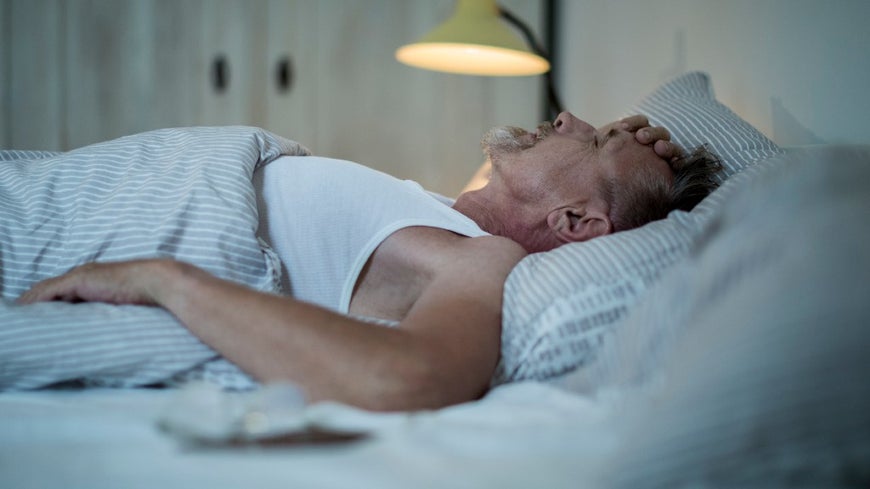4 top ways to curb insomnia during uncertain times

Written by Jane Worthington for Australian Seniors. Here, she talks with Dr Samantha Herath, respiratory and sleep physician at Sydney Adventist Hospital.
Sleeping soundly through the night sounds simple – but for over a quarter of the Australian population, a relaxing night of slumber is difficult. And that is just in normal times.
Since the COVID-19 pandemic began, the percentage of those sleeping poorly has soared from 25% to 46%, due to worries about health, loved ones and money, according to a study by the Turner Institute for Brain and Mental Health at Monash University.
However, getting quality shut-eye is one of the best things you can do for your health in a time of pandemic, says Dr Samantha Herath, respiratory and sleep physician at Sydney Adventist Hospital.
“There are certainly things we can do to improve quality sleep time,” she says. “This in turn helps strengthen immunity and there is growing research better sleep also decreases the chances of contracting respiratory infections.”
Sleep, or lack of it, can also greatly affect mood. ‘Coronasomnia’ – as the new wave of coronavirus-related insomnia has been dubbed – is also closely linked to severe depression, says Professor Ian Hickie, co-director at the Brain and Mind Centre at the University of Sydney.
The pain of “disturbed sleep”
“Disturbed sleep may raise the risk for suicidal behaviour, independent of depression or other mental health issues,” he says. “That’s why it’s so important if people notice signs in their partners or themselves to see their GP – because depression and anxiety are highly treatable when acted on early.”
Dr Herath adds that sleep apnoea is also an underrated culprit in pandemic times. Patients with obstructive sleep apnoea experience repeated episodes of obstruction of the throat as they sleep, causing brief pauses in breathing and disturbance of their natural sleep rhythm.
“One preliminary study has already implicated obstructive sleep apnoea as a culprit in ‘cytokine storm’ – the deadly overreaction of the body’s immune system – that is a hallmark of severe COVID-19 infections,” she says.
So, what does the pandemic mean for Australians who experience sleep apnoea? “Be alert but not alarmed,” says Dr Herath. “If you develop symptoms of COVID-19 you should get tested straight away and if positive, seek the advice of your doctor.”
Sleep apnoea a major health challenge affecting Australians
Undiagnosed sleep apnoea can also be a key cause of insomnia, as the disruption it causes to breathing can make it hard to get a good night’s rest. But an underlying health condition isn’t always to blame. The simple truth is that many Australians are just not getting enough sleep.
“Lack of sleep once used to be a badge of honour and productivity, but today we know the real dangers of poor sleep,” says surgeon Dr Dinesh Choudary, co-author of new health book The Exercise Prescription.
“Outside of coronavirus, poor sleep is also linked to increased risk of accidents. Chernobyl, and the Challenger Space Shuttle disasters all had long shifts and fatigue as a contributing factor,” he says.
“Nowadays, it’s not enough to give up sugar, processed food and alcohol in the name of health. Clean sleeping has become the new clean eating.”
Here are 4 top tips to help improve your sleep and get a better night’s rest
1. Establish a good bedtime routine
Dr Herath says that waking up and going to bed at the same time every day, aiming for seven to eight hours of sleep a night and getting direct sunlight exposure into your eyeballs first thing in the morning (to help regularise the wake/sleep cycle) are the mainstays of good sleep hygiene. “If you’ve got the 24-hour clock wrong, as you get older, you will have many more physical health and mental health problems,” adds Dr Choudary.
2. Avoid electronics before going to sleep
Many of our evening activities are actually detrimental to a good night’s sleep. “Late-night reading on an iPhone [or other smartphone] or desktop, or a late-night TV binge, can send sleep hormones into havoc, because the blue light these devices emit make the brain think it’s time to wake up, when really we should be winding down,” says Dr Herath.
3. Step up your exercise regime to get more shut-eye
Dr Choudary believes that exercise is the key to improving sleep. “The more time you spend exercising, the more shut-eye your body needs and a study in the Journal of Sleep Medicine found that insomniacs slept 85 minutes more per night after working out [four times a week] for just four months. Sleep also makes your muscles and tissues stronger and more resistant to fatigue and injury.”
4. Consider a ‘sleep divorce’ when sharing a bed with your partner
Partners can be sleep saboteurs, says Dr Herath. “Moving to another room is increasingly becoming the solution for couples where partner disturbance is an issue. In fact there is even a term for couples sleeping apart – sleep divorce. About one in four couples today sleep in separate rooms. Many couples have learned to maintain healthy, intimate relationships despite sleeping separately.”
21 Jan 2021